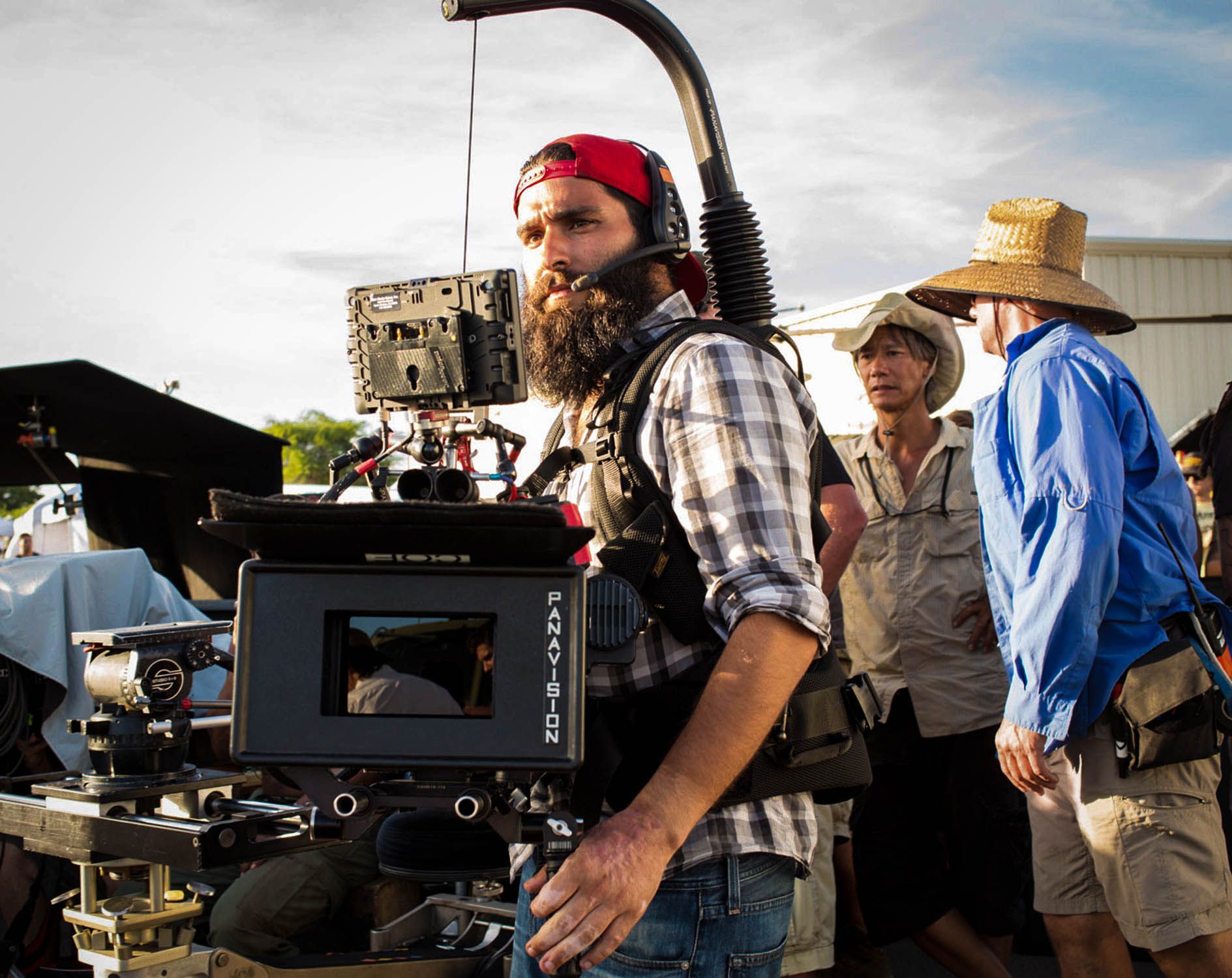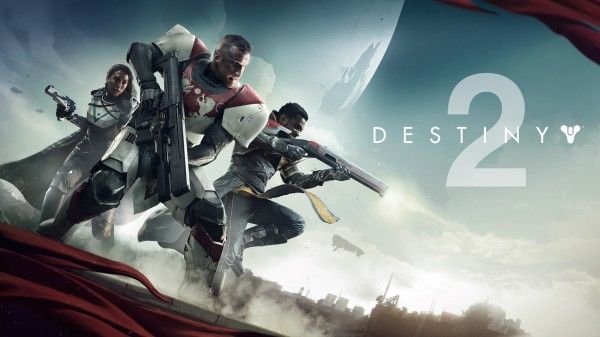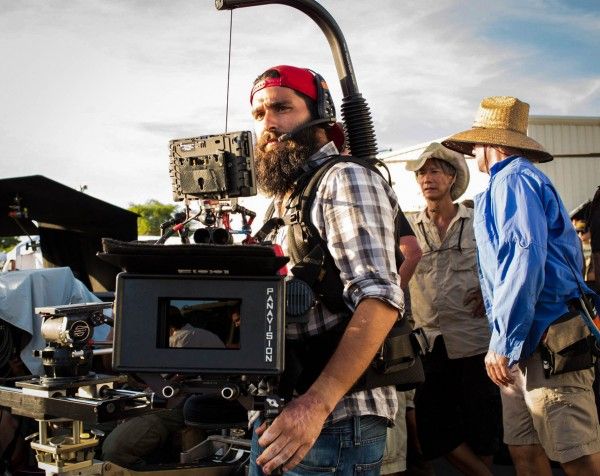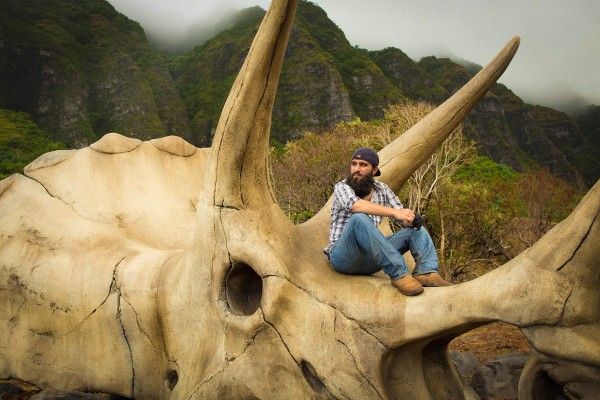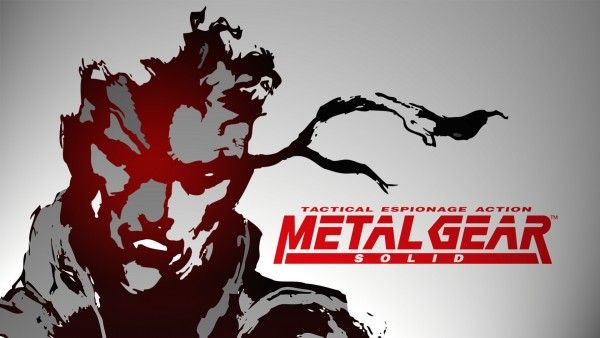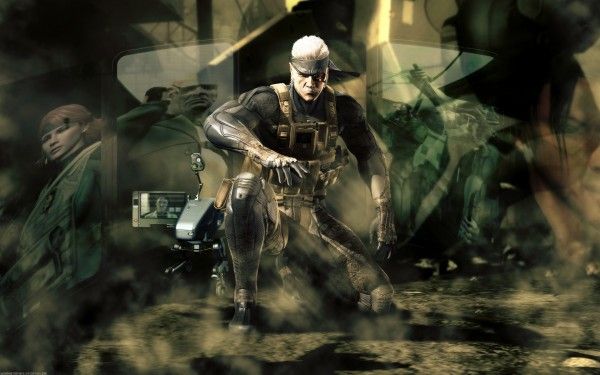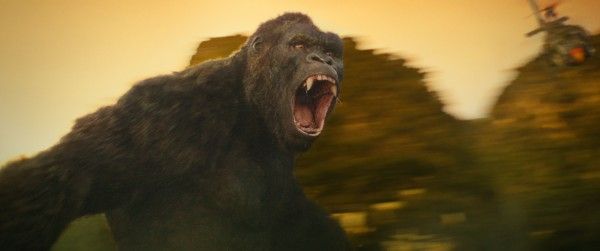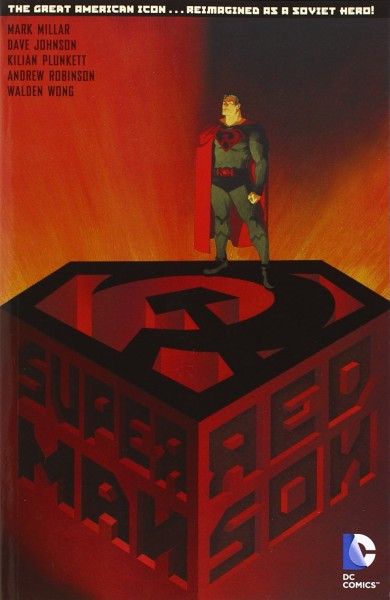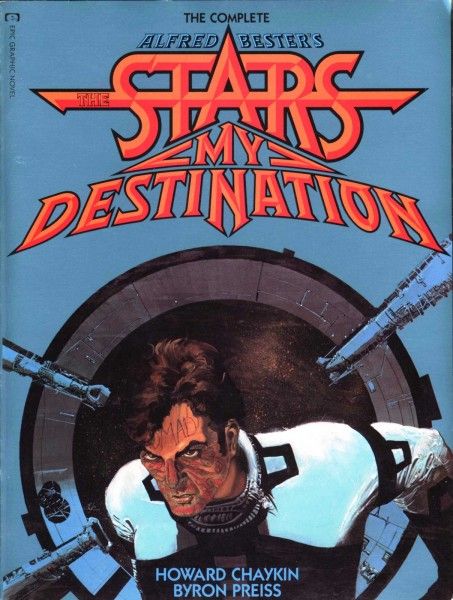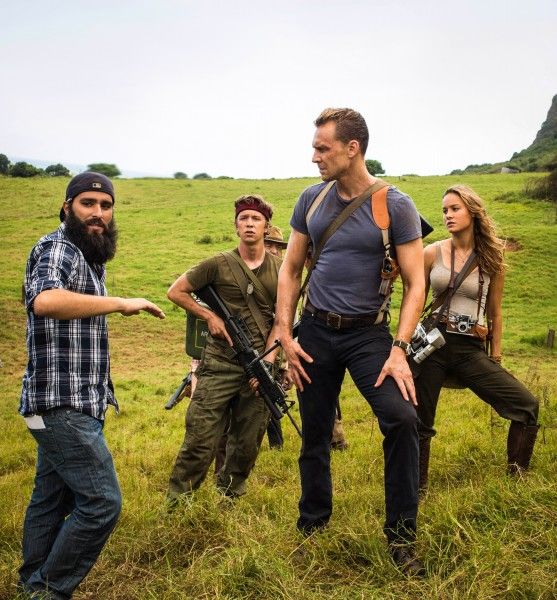Jordan Vogt-Roberts is keeping busy. Coming off the success of Kong: Skull Island, he's got adaptations of Metal Gear Solid and The Stars My Destination in development, but rather than rushing into production on a new feature film or even returning to the excellent TV series You're the Worst (for which he helmed the pilot), he decided to go back to commercials and direct the fun Destiny 2 trailer.
Last week, I spoke with Vogt-Roberts about the Destiny 2 trailer and was also went into a variety of other topics including the upcoming Godzilla vs. Kong, his plans for Metal Gear Solid, adapting The Stars My Destination, and his screed against Cinema Sins.
So did you want to move from Kong: Skull Island into Metal Gear Solid?
JORDAN VOGT-ROBERTS: Look, I would love to go straight into Metal Gear Solid. There was a bunch of other movies that I got offered. Things that honestly would have been a childhood dreams franchises that I care very much about, but they were like, "We got to start now," and I was like, "I can't, I don't have it in me to just jump into something right away, and so I was going to go and do some episodes of "You're the Worst," which is the FX show that I directed the pilot of and it has a really brilliant show runner and a really brilliant cast and I'm really proud of that show. That would have been me working with actors?
And I love that show.
VOGT-ROBERTS: Thank you. But it would have been a very big departure from visual effects and things like that. It would've been casual. I was going to go and sort of ease into that. Then I've been doing commercials for a while, but I've been out of the commercial game for like seven years, because I went back to back from "Kings of Summer" to the "You're the Worst" pilot to "Kong."
I'd been wanting to do commercials just because I love playing around in that art form and that medium. Then these boards came in and suddenly, I was like, "Wait. These are boards for a video game, a sci-fi game. It's made by Bungie. It has comedy in it. It allows me to sort of flex my own sort of creativity and design a bunch of set pieces and it just became this really perfect storm.” The copy that came to me from 72andSunny and Activision was just, I thought, a great spot. It was an unorthodox commercial because Joe Kosinski did the previous versions of these, so there was filmmaking pedigree behind it. For me, even to be able to play in that sandbox, was kind of an honor.
How did you strike the balance between you want to tell a story just within the short time frame, but you're also trying to sell the game, both to old fans and people who have never played the first game?
VOGT-ROBERTS: Well, that actually, to me, was the number one thing that was super important to me, because outwardly, I think 72 and Activision very much have Bungie's best interests in mind in terms of getting this game out there in the right way, but as a gamer myself, there was a long time where you feel like these things that you love are being sold to people that fundamentally aren't you. Especially back in the nineties, when we were all playing video games, people would go and they would take these properties that we love and try to sell them to the non-core.
I was very vocal really early on of saying, "Great. We absolutely can make a spot here there that reaches as many eyeballs as possible who've never heard of Destiny, who don't know who Bungie is, who have heard of the first game or maybe looked past the first game. We absolutely can target those people, but if we do that, and when we do that, we can never lose sight of the fact that there are people that have logged thousands of hours into this game and it means something to them. We have to be able to kind of walk that total tightrope the entire time. We need you to design something that Destiny fans can say, 'Hell yeah. That's the world that I've been playing. That's what it feels like to be a Guardian. That's what it feels like to play with a fireteam.' That's what it feels like to sort of execute an amazing move, but also through the use of the explosions upfront and Cayde speech, we're able to ease an audience in who might know nothing about that world."
No, and it gives a good impression of, like you said, sort of the comedy and the action combined, to not just say, "This is just another shooter."
VOGT-ROBERTS: Well, it's not just another shooter.
Right.
VOGT-ROBERTS: I give so much credit to Bungie as a developer. I went up there for a day and just was able to really pick their brain on so many things, but those guys are so talented and so smart. I think that they wear their influences on their sleeves, but nothing in that game really feels derivative. The whole game has this kind of beautiful ad hoc art style that's such a fusion of different things. You have a very Moroccan-bohemian vibe that's mixed with a bit of Blade Runner. You have sort of sci-fi magic in the game that's fantasy but also pure sci-fi.
It's such an interesting combination and, to me, one of the biggest challenges in it was actually saying, "Even more so than the previous spots, even more so than what Hollywood would traditionally do when they try and adapt something like this, let's fully commit to that world. Let's not be afraid of the use of color. Let's not be afraid of this crazy art style. Let's not be afraid of the fantastical stuff, and I promise you we can make something that feels like an awesome shooter that you can market to the world, but that is awesome because it commits to what it is."
I'm so happy reading so much feedback where a bunch of people are talking about the use of color. They're talking about how crazy that it sort of looks. They're talking about the feeling of what it is to kind of be on a fireteam.
Is that all-in approach something you're also thinking about taking with Metal Gear? Because that game is one of the few video games that breaks the fourth wall. It does a lot of weird, interesting things.
VOGT-ROBERTS: It's all-in, all the time. For me, I think ... look. With properties, you obviously have to make adjustments and concessions and there are just certain things that translate differently on film, but we easily could have shot this Destiny spot and muted the colors and not gone for that stuff and played in a much different way. But to me, that's not what Destiny is, so then that's a failure to me. I'm so fortunate to have people like Eric Hirshberg at Activision who really want to back that vision and the people at 72 that say, "Yeah, let's go for it so we can protect Bungie's voice."
With Metal Gear, absolutely, my thing is we need to not just make a Metal Gear movie, but we need to double-down so hard on the oddities that make Metal Gear idiosyncratic and what it is—Kojima's voice, the fourth wall, the goofiness, the anime, the manga, the hyper-violence, the talking philosophies, the characters who just represent ideologies. These things are Metal Gear, and I think, when you look at Guardians of the Galaxy, it's like, "What genre is that before that movie came out?"
James [Gunn] doubled-down on that world and said, "No. This is what's going to make people love it," as opposed to saying, "Uh, it's kind of like this" or "It's kind of like that." "It's sort of a little bit of that." No. That was able to be what it needs to be, and so for me, in the success of Kong, in the success of Logan, in the success of Deadpool, I'm able to go to the studio and say, "Let's double-down on this and make this the absolute best version of Metal Gear that it needs to be."
Do you feel like other video game movies have kind of held back a bit, and by trying to thread the needle, they're not being true to their source material and that's where they're getting hung up?
VOGT-ROBERTS: Absolutely. I think that's a huge part of it is ... and look, I will even admit and sort of publicly talked about this. The first draft that we were doing on Metal Gear, I didn't have the standing that I, to some degree, do now in the success of Kong and so, there always was a little bit of trying to sort of thread the needle, but making something that people felt could get made and was safe. I give so much credit to my people at Sony and my producers at Metal Gear now, because post-Kong, I was able to sort of say, "Hey, let's all put our heads together and let's acknowledge that this previous draft, as much as I was trying to fight for what I believed Metal Gear was, we were still trying to kind of thread the needle a little bit, because we needed to get that movie made."
Then you're like, "Okay. We'll fix this later. We'll fix it," but I was able to stop and say, "No. This is not the approach. Let's make this exactly what it needs to be, which is Kojima's voice, and find a way to filter that through a cinematic language." I think most video game movies have a problem, because they do try and have one foot in one door and another foot in a completely door.
With Metal Gear Solid, are you looking just to adapt the PS1 game, or are you going to try to pull from the earlier Metal Gear games that have been the Metal Gear Solid sequels, because there's been so much mythology over the decades that Kojima's built up.
VOGT-ROBERTS: Well, look. On one hand, I'm trying to make a game that Metal Gear fans who are so passionate say, "That's my Metal Gear. I'm so proud that this is on screen. I'm so proud it's on screen this way. This is exactly what I knew it could be a movie. When I first played Metal Gear or when I first played Metal Gear Solid" or whatever they got in the franchise when they were a kid playing that game, the movie they saw in their mind, I'm going to make that.
On the other hand, it's a tricky thing where I just gave an hour-long talk with Kojima at E3 and I asked him point-blank in front of an audience, because we had a long conversation about him and film and I said, "What would your advice be to me? What would you have to say?" And he said, "Do what I would do. Betray your audience," which is just such a Kojima thing to do. I want to be very respectful to the canon. I want to be very respectful to the characters and the story, but it will not be a pure adaptation, necessarily, of one of the games.
I'm going to be ... I'm doing something really interesting with a time device that I'm excited about that I'm so happy, once again, I pitched this. Much like when Kong when I pitched that kind of Harryhausen movie with “Platoon.” I thought they were going to laugh me out of the room. This is the type of idea I pitched to Sony saying, "This is what I think would be fucking badass" and they were like, "Cool. Let's do that." We're playing with all of the different elements of it and we're sort of combining different themes and different arcs and things like that, but I can't really get into specifics on it.
One of the things I really liked about Kong is that Kong has a character. He's not just a CGI thing. He's not just a monster, but you get a sense of personality. Have you spoken with Adam Wingard at all about "Kong vs. Godzilla" and sort of the way Kong'll be viewed in that film?
VOGT-ROBERTS: Yeah. Adam and I have sat down a couple of times, actually. I was actually so excited when they announced it was going to be him, because as much as I very outwardly was like, "I can't make another monster movie right now," there was a point when the movie was coming out where you almost have these pangs of sadness because your baby's about to be handed off to someone else. My 100-foot tall son of a gorilla was going off to college, and so there was this moment where I was like, "Oh no. Maybe I should be doing that movie." And I was like, "No. You can't. There's no part of you right now that can do another giant monster movie."
Talking to Adam made me so happy because he, in particular, really understands the kind of anime, manga, mech sensibility that I was trying to bring to Kong. He gets that and that was something that I fought so hard for and was so difficult to sort of realize to life through concept to execution with ILM. That's one of the things I'm most proud of with him. I think he truly gets that and he truly wants to lean into this version of Kong that kind of was borne from my crazy and stupid video game brain.
Yeah. I mean, there's also obviously room for him to maneuver, because it's presumably his Kong is taking place decades after your Kong-
VOGT-ROBERTS: Yes.
If he's going to match up with Godzilla.
VOGT-ROBERTS: Yeah. He's got plenty of freedom to sort of play around with how he wants and to play around with ... I always joke that my Kong was kind of like a character in a Shane Black movie in the sense that he just gets beat the fuck up by the end of the movie. He's just battered and scarred, and so he's got that kind of reluctant protagonist vibe to him. I think Adam's willing to take that anime thing and do what he needs to do as he squares off with Godzilla.
Because Kong: Skull Island was such a hit, is there any movement on a sequel post-"Kong vs. Godzilla" that just focuses back on Kong?
VOGT-ROBERTS: That's not really gotten brought up. To this day, I would throw my hat in the ring in a heartbeat to go make a prequel with John C. Reilly that shows him and Gunpei, the pilot from World War II crashing on the beach and what their relationship ... just this weird kind of almost "Enemy Mine" movie or "Hell in the Pacific," but with John C. Reilly fighting monsters, having it be a weird kind of comedy. I've not heard any official plans to make a proper sequel, but I would make that John C. Reilly movie in a heartbeat.
It looks like WB recently is kind of taking you up on your idea about doing DC films that are unconnected to the DCEU. Do you think that "Superman: Red Son" could be a possibility now that they're like, "Oh, we don't have to make everything connected."
VOGT-ROBERTS: Well, apparently they're taking that idea. They're not taking me up, because I have gotten no phone calls about that. I was surprised to hear the headline, regardless of whether or not they want to do Red Son, I think that is the smartest, most punk rock thing that DC can do right now to separate themselves from Marvel is just to double-down and say, "We're going to tell a bunch of crazy stories. We're going to tell stories in different universes and different times and really play around and just tell you great stories with these characters." To me, I think that the expanded universe is one long story thing that will always serve its purpose, but we've got to think about what's next.
To me, that's interesting. To me, that's ... I'm happy that they're apparently now entertaining that idea. I would love to get a call saying, "Hey, do you want to talk about Red Son?" But I have yet to receive that phone call.
Are there any other Elsewords stories that you'd want to tackle other than Red Son?
VOGT-ROBERTS: I mean, not necessarily in that world. I think Hush has always been a very cool story, but honestly, my favorite part in Hush is actually when Superman shows up, just their dynamic in there, I think is so great. I was always a big Swamp Thing fan too, but I think they have other plans for Swamp Thing right now, and obviously, he's slightly related to Justice League Dark. Honestly, I haven't really been focusing too much on the DC world, partially because I haven't gotten that Red Son phone call. My focus is really on trying to just tell other interesting stories and setting up a lot of things in TV and trying to do more commercials like this Destiny stuff. I've got this book "The Stars My Destination" at Paramount that I'm trying to get made, and hopefully, Metal Gear.
What’s interesting about "The Stars My Destination" is that that book has been ... tried to be adapted for so long. It's such a tough nut to crack. What is it about the material that you find so appealing with that one?
VOGT-ROBERTS: Well, apparently, I have a stupid knack for wanting to take on projects that people call "unfilmable." Maybe I'm a masochist. Stars is just a really great book because Alfred Bester, when he was writing, he was one of the few writers who prose writing back then was a real sense of style. A lot of sci-fi from that era, when you read it, it was incredible ideas, just some of the most thoughtful things you've encountered, but it was ultimately very dry. When you read Bester ... he's only written a couple books and some short stories, but it's so explosive.
It's literally like each page of "The Stars My Destination" almost has enough ideas in it that could fill an entire movie normally. Stars is borderline one of those books like Neuromancer or John Carter or things like that that has almost been deeply mined for its ideas already, except I still think there's an incredible amount of relevance to it and I think that the ending of that book sticks the landing in such a profound way. I love the characters. I love the sort of antihero and protagonist. I love the journey he goes on. I mean, it's so filled with different ideas and the way that I want to make it I think is very fresh and interesting.
Look, I would love to make it as a self-contained movie, but we also now live in an age where it would make an incredible limited series. That's a story I would love to tell. If I don't tell it, I'm going to make sure Park Chan-wook makes it, because he's been very vocal about always wanting to have made that. We had a conversation about it once. He's my favorite filmmaker on the planet, so I feel very conflicted having a property that he himself wants to make. But it's just one of the most special books that I've ever read.
Well, and it starts off in such an interesting place. I mean, you have sort of this "Count of Monte Cristo" in space aspect and then it just starts spreading out to all these very unexpected places.
VOGT-ROBERTS: Well, I think part of that too is if you really get into the nitty-gritty of why the book kind of feels disjointed like that ... you'll be halfway through the book and they'll still be introducing really insane, cool ideas. Part of that's a byproduct of the fact that when the book was written, it was being written for a magazine, so it was being written in installments. Each installment had to kind of grab the viewer in, in an unexpected way. I think by nature of just how it was being written, who it was being written for, the structure of it actually almost works against the way that it needs to be reconceived for a film, because you're constantly introducing sort of new ideas and new rules about jaunting and things like that seven chapters into the book.
It’s definitely a heavy lift, but hopefully, it'll all come together.
VOGT-ROBERTS: Yeah. We've got a plan and I'm super psyched about it and the people we're working with at Paramount are also super smart and super passionate. Like I said, apparently I have a knack for properties people call "unfilmable," but we live in a time when people don't want to go to the movies, so I think we've got to take risks.
One other thing is you really let CinemaSins have it on Twitter. Do you hope that maybe they'll change their ways, or do you think they're just going to dig in and keep being wrong about what they're doing?
VOGT-ROBERTS: I think they're just going to dig in. They make too much money off of it. If you really look into CinemaSins, I believe one of the guys who's involved wrote a book on searching and optimization, so there's a pretty big couple of question marks associate with that, especially with, "Oh. Why are their videos almost 20 minutes long? Oh, because through search engine optimization, Google is going to put that towards the top of the list because of the way the new algorithm works." So, this movie does ... videos are no longer 20 minutes because they deserve to be 20 minutes. It's purely based on them making money and getting views.
Look, I would love to talk to that guy and I didn't ... for me, a lot of people took it as like, "Oh, you can't take criticism. Oh, you" ... and it's like, "No, no, no. I love critics." Critics are some of my best friends in the world. I love good criticism. I read my bad reviews because I want to understand how people feel about my work and what worked for them and what doesn't, and that doesn't mean I necessarily agree with them. A lot of times, I do. What people forget is I'm by biggest critic.
If people don't think that I fundamentally know every problem with my movie, they're wrong. But the thing with CinemaSins that drove me nuts is it's ... well, they hide behind this idea of it being a joke or satire, and it's neither of those things. There's no joke there and there's no satire there. Instead, it's just destructive to this art form that we love, because it's nitpicks that almost have a disdain for the way cinema itself works. It really is mean-spirited towards the concepts of cinema. It's a very strange thing, so I would love it if they actually thought about, "Wait. Do we love movies? Are we hurting things?" But I doubt it would get through to them.
I was surprised that that got so much heat and it was really interesting, because there was a fuck-ton of people who came out on my side and said, "Yeah, dude. I'm glad someone said this. We're totally with you." Even a bunch of critics, things like that, a bunch of websites, and then there were a lot of people online that just said sort of like, "Aww, you can't take a joke. Aww, you don't understand. It's satire." It's like, "No. It's not satire. What is it satirizing? It's also ... I mean, if it's a joke, it's a bad one."
It was such an interesting thing and people don't understand. I love criticism. I'm a dick to my friends. You know why I'm a dick to my friends? Because when they come and see my movie, whether I'm bringing in Ryan Coogler or writers I've worked with or other producers I've worked with or whomever, I need them to be brutally honest with me. What works about my movie, what doesn't, what they're engaged with, what they're not. That doesn't mean that I have to agree with them, but I need to hear that, because that's the only way that my work is going to improve. I think any creative person has to be able to take that kind of criticism and when I go see their movies, I'm going to be honest too. I have a lot of friends that I go see their movie and I'm like, "Dude, that's not good right now." It's all in a loving way to say, "How can we make this better? Let's talk about it."
The way in which that situation, I think, blew up, I thought was interesting, and the way in which people took very strong sides of it, I also thought was interesting. I have no idea where they go from here. I would be shocked if they're able to snap their heads out of making bank off of other peoples' movies through searching and optimization tricks, but we'll see.
I mean, to me, and I've been a critic for over 10 years now, and I am worried about them in a sense, because I don't want them shaping young movie fans to be like, "Oh, this is how you appraise movies"-
VOGT-ROBERTS: Right.
As like a goof session on IMDb, and half those goofs aren't even goofs.
VOGT-ROBERTS: Well, right. A goof session's one thing, right?
Right.
VOGT-ROBERTS: That's where it gets tricky. If it's goofs of its actual airs and its continuity, if it's things you're pointing out, or if you look at RedLetterMedia's breakdown of "The Phantom Menace," it's like, "Whoa. That's actually a really interesting point that I didn't realize how that makes no sense." Right? But what they do is this nonsensical thing that's often, a lot of times, sexist when they're talking about girls, but then there's very odd nitpicks that have no basis from one moment to the next. It really is ... the thing that worries me, like you said, is it's a content brander that basically it's just like, "Everything sucks." That's your content brander. That's your brand.
I think that's a very destructive way to look at film and filmmaking and film criticism and the way that you look at it. If you love that stuff so much that when you're going to a theater when you're watching a movie, that becomes the filter by which you're watching it? Well then, cinema can't do its job. You can't get lost in a movie the same way anymore.
I'm all for goofs. I'm all for that stuff. That stuff's fascinating, but they go into a different and darker rabbit hole.
Well, and you're also just missing out on the bigger picture. I mean, we can all say, "Yeah, Dorothy's pigtails in Wizard of Oz change length throughout the film," but there's a lot more happening with that movie. I think that it's a fairly influential piece of cinema. Maybe focus on some other things.
VOGT-ROBERTS: Yeah. I mean, to me, it's just ... I broke down a lot of examples. I used Looper as an example in that Twitter rant that I went down to break down ... there's more or less 10 different types of criticism that they give, and very rarely, literally ... some of it's just random stuff where it's like, "Oh, this is how they marked the location on the map." It's like, "Okay. Should they not mark it that way? I don't understand what you're asking or saying." It's snarky and I truly think it ... I don't want make judgments on those guys, because I don't know them, but it truly just comes across as angry to me, like angry in a way where they ... it just comes across as someone who's unhappy and wants to make other people unhappy.

